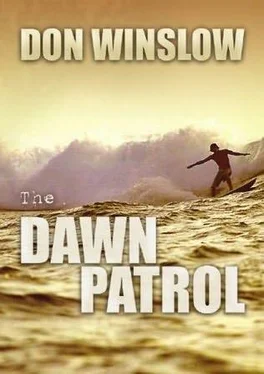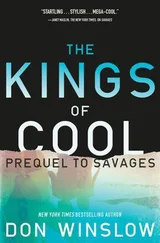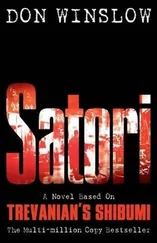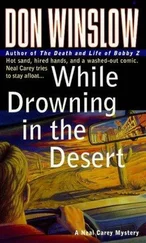Don Winslow - Dawn Patrol
Здесь есть возможность читать онлайн «Don Winslow - Dawn Patrol» весь текст электронной книги совершенно бесплатно (целиком полную версию без сокращений). В некоторых случаях можно слушать аудио, скачать через торрент в формате fb2 и присутствует краткое содержание. Жанр: Триллер, на английском языке. Описание произведения, (предисловие) а так же отзывы посетителей доступны на портале библиотеки ЛибКат.
- Название:Dawn Patrol
- Автор:
- Жанр:
- Год:неизвестен
- ISBN:нет данных
- Рейтинг книги:5 / 5. Голосов: 1
-
Избранное:Добавить в избранное
- Отзывы:
-
Ваша оценка:
- 100
- 1
- 2
- 3
- 4
- 5
Dawn Patrol: краткое содержание, описание и аннотация
Предлагаем к чтению аннотацию, описание, краткое содержание или предисловие (зависит от того, что написал сам автор книги «Dawn Patrol»). Если вы не нашли необходимую информацию о книге — напишите в комментариях, мы постараемся отыскать её.
Dawn Patrol — читать онлайн бесплатно полную книгу (весь текст) целиком
Ниже представлен текст книги, разбитый по страницам. Система сохранения места последней прочитанной страницы, позволяет с удобством читать онлайн бесплатно книгу «Dawn Patrol», без необходимости каждый раз заново искать на чём Вы остановились. Поставьте закладку, и сможете в любой момент перейти на страницу, на которой закончили чтение.
Интервал:
Закладка:
Boone says, “It's the sort of specialized local knowledge you're paying the big bucks for.”
He doesn't bother to explain to her that most bars-strip clubs included-have arrangements with certain cab companies. When tourists ask a Triple A driver to take them to a strip club, he'll take them to TNG. In exchange, whenever the bartender or bouncer at TNG has to call a cab for a customer who might otherwise be charged with DUI, he returns the courtesy. So if Tammy Roddick called a taxi to pick her up at her place, she probably called Triple A.
“How do you know she didn't have a friend pick her up?” Petra asks. “Or that she didn't just walk?”
“I don't,” Boone replies. “It just gives me a place to start.”
Even though he doesn't think that Roddick took a cab anywhere. What he thinks is that Silver, or some of his muscle, or all of the above came and took her on a long trip to somewhere.
And that they'll never find Tammy Roddick.
But he has to try.
When you get on a wave, you ride the wave.
All the way to the end, if it lets you.
He drives through Pacific Beach.
17
Pacific Beach.PB.
The old beach town sits just a few miles northwest of downtown San Diego, just across Mission Bay from the airport. The marshlands that used to separate it from the city were drained, and now the old swamp is the site of SeaWorld, where thousands of people come to see Shamu.
On the coastline itself, running south to north, you have the great playground stretch of Ocean Beach, Mission Beach, and Pacific Beach-OB, MB, and PB to locals, people too busy to speak in entire words, or to readers of windshield decals. Ocean Beach is cut off from the other two by the Mission Bay Channel, but Mission Beach runs seamlessly into Pacific Beach, the only division being the arbitrary border of Pacific Beach Drive at the head of Mission Bay.
Pacific Beach started as a college town.
Back in 1887, the real estate speculators who had bought the barren stretch of dirt, then a long carriage ride from the city, were trying to figure out how to attract people and came up with the idea of higher education, so they built the San Diego College of Letters. This was during the great boom of the late 1880s, when the railroads were offering six-dollar fares from Nebraska, Minnesota, and Wisconsin and midwesterners flocked to San Diego to play real estate hot potato.
Things did boom in Pacific Beach for the first couple of years. The railroad stretched from downtown, so the city dwellers could come out to the beach to play, and new pilgrims lived in tents on the beach while their gingerbread cottages were being built on lots, some of which doubled in value between morning and noon. A weekly newspaper came into being, largely funded by real estate ads. The American Driving Park was built alongside the beach, where The Sundowner and Boone's office now sit, and Wyatt Earp, on the run from an Arizona murder indictment, came out to race his horses.
It was all good for about a year; then the boom went bust. In a single day, lots that had been worth hundreds were finding no buyers at twenty-five dollars, the San Diego College of Letters shut its doors, and the American Driving Park slowly yielded to the salt air, the hot sun, and sad abandonment.
Wyatt Earp left for Los Angeles.
A few committed hangers-on kept their lots and built cottages, a few of which still cling to life among the hotels and condo complexes that line Ocean Boulevard like fortresses. But for the most part, Pacific Beach slid into decline.
Well, as the trite saying goes, When God hands you lemons…
Plant lemon trees.
Left with little but dirt and sun, the developers of Pacific Beach used them both to plant lemon trees, and around the turn of the century, the community proclaimed itself “the Lemon Capital of the World.” It worked for a while. The flats now occupied by rows of houses were then rows of citrus trees until cheap steamship rates and relaxed import laws made Sicily the Lemon Capital of the World instead; the lemon trees of Pacific Beach were no longer worth the water it took to irrigate them, and the community was back to a search for an identity.
Earl Taylor gave it one. Earl came out from Kansas in 1923 and started buying up land. He built the old Dunaway Drugstore, now the on the corner of Cass and Garnet, a block east of Boone's current office, and then put up a number of other businesses.
Then he met Earnest Pickering, and the two of them conspired to build Pickering's Pleasure Pier.
Yeah, Pleasure Pier.
Right at the end of present-day Garnet Avenue, the pier jutted out into the ocean, and this wasn't a pier for docking ships; this was a pier for, well, pleasure. It had a midway with all kinds of carnival games and cheap food treats, and a dance hall, replete with a cork-lined dance floor.
It opened for business on the Fourth of July, 1927, to flags, fanfare, and fireworks and was a massive success. And why not. It was a beautifully simple, hedonistic idea-combine the beauty of the ocean and the beach with women in “bathing costumes,” junk food, and then the nocturnal Roaring Twenties pleasures of illegal booze, jazz, and dancing, with sex to follow at the beachside hotels that sprang up around the pier.
All good, except that Earl and Earnest forgot to creosote the pilings that supported the pier, and “water-born parasites” started eating the thing. (The uncharitable would have it that water-born parasites-that is, surf bums-still infest Pacific Beach.) Pickering's Pleasure Pier started crumbling into the ocean and, a year after opening, had to be closed for safety purposes. The party was over.
Truly, because with exquisite Pacific Beach timing, the town had reinvigorated itself just in time for the Great Depression.
The tents went up again, but the Depression wasn't as severe in San Diego as it was in a lot of the country, because the navy base in the harbor cushioned the unemployment. And a lot of people loved Pacific Beach in those years for precisely what it didn't have: a lot of people, houses, traffic. They loved it precisely because it was a sleepy, friendly little town with one of the best stretches of beach in these United States, and the beach was free and accessible to everyone, and there were no hotels or condo complexes, no private drives.
What changed Pacific Beach forever was a nose.
Dorothy Fleet's sensitive nose, to be exact.
In 1935, her husband, Reuben, owned a company called Consolidated Aircraft, which had a contract with the U.S. government to design and build seaplanes. The problem was that Consolidated was located in Buffalo, and it was hard to land seaplanes on water that was usually ice. So Reuben decided to move the company to warm and sunny California, and he gave his wife, Dorothy, a choice between San Diego and Long Beach. Dorothy didn't like Long Beach because of the “smelly oil wells” nearby, so she picked San Diego, and Fleet built his factory on a site near the airport, where he and his eight hundred workers came out with the great PBY Catalina.
Airplanes had a lot to do with creating modern Pacific Beach, because Japanese bombers hitting Pearl Harbor launched the Consolidated factory into high gear. Suddenly faced with the job of producing thousands of PBYs plus the new B-24 bomber, Fleet imported thousands of workers- 15,000 by early 1942, 45,000 by the war's end. Working 24/7 they pumped out 33,000 aircraft during the war.
They had to live somewhere, and the nearby empty flats of Pacific Beach made the perfect location to put up quick, cheap housing.
And it wasn't just Consolidated Aircraft, for San Diego became the headquarters of the Pacific Fleet, and between the navy bases around San Diego Harbor and the marine training bases at Elliott and Pendleton, up by Oceanside, the whole area became a military town. The city's population jumped from 200,000 in 1941 to 500,000 by 1943. The government built a number of housing projects in Pacific Beach-Bayview Terrace, Los Altos, Cyanne-and a lot of the men and women who came to live in them temporarily never went home. A lot of the sailors and marines who were stationed in San Diego on their way to and from the Pacific front decided to come back and build lives there.
Читать дальшеИнтервал:
Закладка:
Похожие книги на «Dawn Patrol»
Представляем Вашему вниманию похожие книги на «Dawn Patrol» списком для выбора. Мы отобрали схожую по названию и смыслу литературу в надежде предоставить читателям больше вариантов отыскать новые, интересные, ещё непрочитанные произведения.
Обсуждение, отзывы о книге «Dawn Patrol» и просто собственные мнения читателей. Оставьте ваши комментарии, напишите, что Вы думаете о произведении, его смысле или главных героях. Укажите что конкретно понравилось, а что нет, и почему Вы так считаете.












